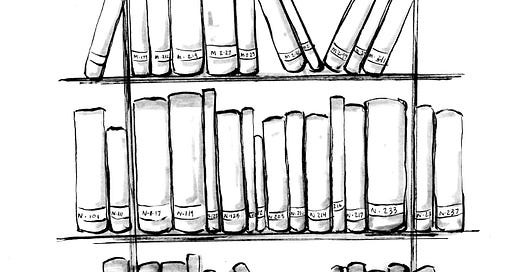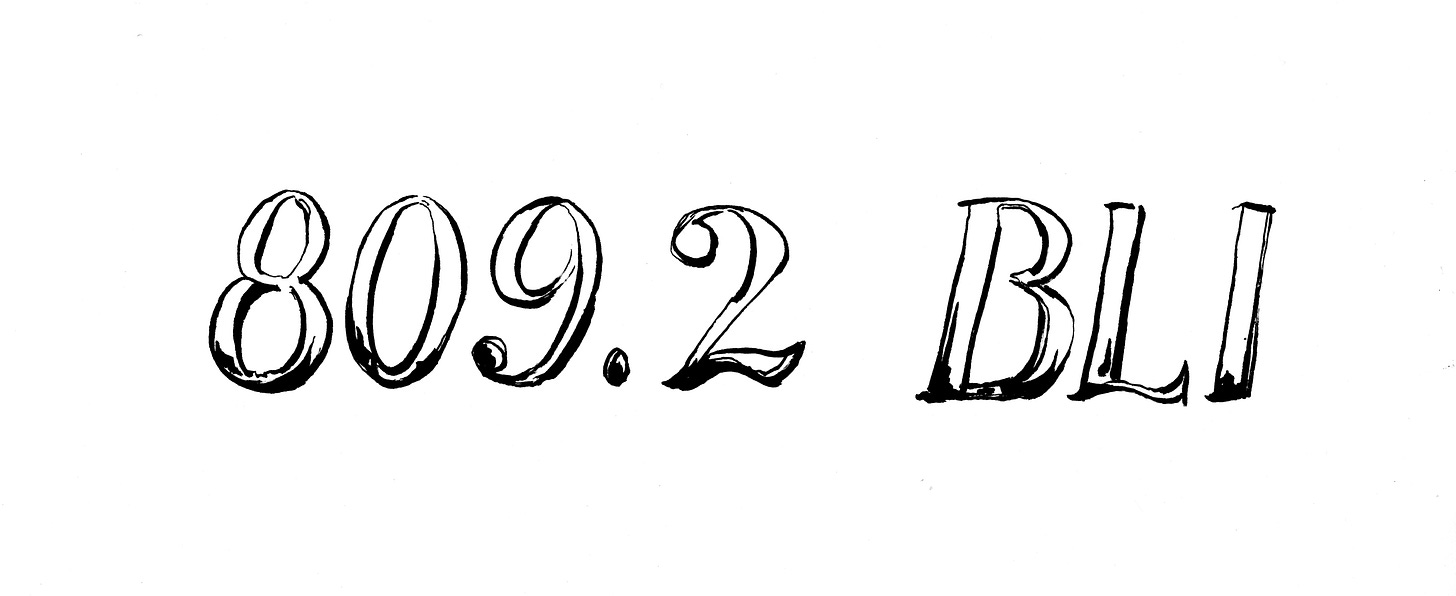Twenty years ago, I found myself needing something to do to take my mind off itself. So I started shelving books at our local library. It required just enough attention to keep anxiety at bay and wasn’t the least bit stressful—unless I started feeling bad for books that had been incorrectly shelved and might get lost in the invisible world between the card catalog and the shelves…little bound voices crying in the wilderness, wondering if anyone will ever find them.
Now that you mention it, it was kinda stressful.
Shelving books gives you time to ponder all kinds of deep existential questions. What’s the difference between vegetarian garden cooking and garden vegetarian cooking? Just how many Idiot’s Guides do we need? Are there that many idiots in the world? Is that the most idiotic question I ever asked?
Do we need so many books about how to get into a college or out of a marriage? How can one category (the 600s) include Breastfeeding Made Simple, Why We Love the Dogs We Do, and a 1400-page book called Complete Illustrated Encyclopedia of the World's Firearms?
And then there’s the ultimate shelving koan: “Who reads all this chazerai?”
Our library, like many, uses the Dewey Decimal System. It’s OK if you’ve never heard of it…especially if you were born after 1990 and always do research online or at a library that uses the Library of Congress system.
All you need to know is that the Dewey Decimal System is the underlying framework for those numbers on the spines of non-fiction books.1
I was well into this piece when I realized I’d forgotten to double check the name of the person who developed the System. I’d alway assumed it was John Dewey, who was a pretty smart guy, good writer, and a big fan of democracy. But I soon learned it was, instead, a guy named Melvil Dewey which seemed like a pretty dweebish name for someone who was probably pretty dweebish himself and created a really dweebish masterpiece of categorization. However, further research led me to the incontrovertible fact that he wasn’t some little guy with huge spectacles who wouldn’t hurt a fly. No:
Melvil Dewey was a sexist, racist, homophobic antisemite.
This is not some modern revisionist woke history.
Multiple women—colleagues and employees—accused him of molestation.
He founded the Lake Placid Club which banned Jews, Blacks, and anyone “against whom there is a physical, moral, social or race objection, or who would be unwelcome to even a small minority.”
And his classification of homosexuals (see below), make his attitude towards the LGBTQ community perfectly clear.
Can’t some organization like the American Library Association take his name off the system? I wondered. Indeed, in 2020, they changed the name of their Melvil Dewey Award to the ALA Medal of Excellence. But on their website they still refer to him as a “library pioneer,” which I suppose would make more sense if he were exploring a less-bigoted frontier.
Even taking his name off the system wouldn’t completely solve the problem because, even though he revised the system over time, those versions were consistently racist, homophobic, and misogynistic in ways that very few people would approve of these days. (This is not the place to discuss those few people who would approve. You know who you are…or worse, don’t.)
For example, LGBTQ topics have variously been assigned to categories such as Abnormal Psychology, Perversion, Derangement, as a Social Problem or even a Medical Disorder.
If you wanted to find a poet of color you’d be led to Colonization (326’s).
Political books about white people were in History. Ones about Black people, immigrants, and women’s rights were in Social Sciences.
(BTW: To add personal insult to injury, I discovered he went to the same college as I did, which is enough for me not to admit what it was. Jeez.)
There is, however, some good news. The System is regularly revised by the Online Computer Library Center (OCLC). The 24th Edition came out in May and, according to the OCLC: “Notable additions to this year’s version include new and updated topics and subtopics—such as Islam, pandemics, historical periods…as well as the addition of new topics related to diverse cultures and communities.” Plus, their current Editor in Residence, Kathryn Becker, is focusing on LGBTQIA topics because “it is important for people to be able to find information—possibly about themselves—in an accurate grouping, and not a grouping of outdated thought.”2
I know it’s not always fair to use current “norms” to criticize former times. I also know that there are legitimate reasons to edit and re-edit a categorization system. But, we’re talking 2023! The fact that, after 150 years, people are still untangling the Dewey Decimal system from some blatantly systemic prejudices is surprising, troubling, and somewhat weird.
One of the joys of library browsing is discovering books on similar topics on the same shelf. Which means Melvil’s prejudices have permeated the stacks of libraries all over the world—and subtly influenced everyone from high school students to famous academics for more than a century.
Last week I started writing about my search for the perfect chair. And ended up writing about Vietnam. This week I started writing about what I always considered a masterpiece of obsessive organization and ended up writing about systemic prejudices.
You never know where a little research will take you.
These days, when it seems we have to claw our way through jungles of misinformation, it’s not only hard to find objective facts but to be aware of how much subjectivity is built into even well-meaning presentations of those facts.
Intellectual freedom is hard won. All we writers can do when we “look it up” is maintain a healthy skepticism and fierce curiosity.
Which naturally brings us to artificial intelligence and ChatGPT. But, that’s for another time…






"Political books about white people were in History. Ones about Black people, immigrants, and women’s rights were in Social Sciences." I had no idea. Really brings it home. Thanks for sharing.
This piece deserves *way* more attention. Thank you for your insights.